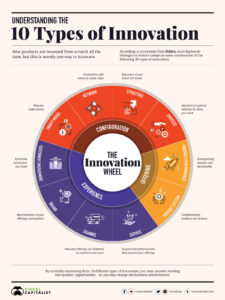
Imagine that someone was to say to you, “I’m involved in an innovative project.” What assumptions would you make about the project? Take a moment to be in that conversation and truly consider my question.
The word “innovative” will tip you off that they are working on something new. You may also assume that there is a degree of risk or uncertainty in the project’s outcome because it is new. It is also likely that you assume that the project involves some new technology, or an existing technology applied to a new domain.
It’s that last assumption that I would like to focus on for a few minutes. Why is it that we tend to associate innovation with technology? My guess is that we are simply used to seeing the two go hand in hand in our 21st Century world. There have been so many astounding advances in technology in the past 20 years that our brains are almost conditioned to join the two concepts together.
But when I go to Google and search the word “innovation” and then look at the news articles, it tells a different story. The day I did it, I saw articles about innovation in new medicine, agriculture, finance and, of course, technology. Why is this important? It is important to test our assumptions because we may miss opportunities if we understand concepts too narrowly.
Let’s reset our assumptions about innovation with Richard Lyon’s definition of innovation: “Fresh ideas that create value.” A fresh idea can be a technological one, but it sure doesn’t have to be. Let me give you an example.
I serve as Chief Innovation Officer at SIL and we are working on a variety of innovation efforts. One effort involves using artificial intelligence to support multilingual chatbots being used in Scripture Engagement on facebook. That is an example of a tech innovation. We are also working on a literacy program designed to engage children in learning and acting on a social issue as a way of making their local language have immediate benefit while they learn to read.
Both are fresh ideas that have the potential to create value, but only one is highly dependent on technology in its design. I’m not writing this to discourage your search for innovative technologies. My main point is that if you associate innovation and technology too closely together, you will miss out on other amazing innovations that don’t fit your understanding.
As you seek to innovate this year, look broadly and be open to fresh ideas that could take a variety of forms. It could be a new process, product, service, business model, marketing strategy, etc. Allow yourself to think innovatively in all the areas of your work and I guarantee you will be amazed at what you uncover!
To explore 10 Types of Innovation in infographic form click here.